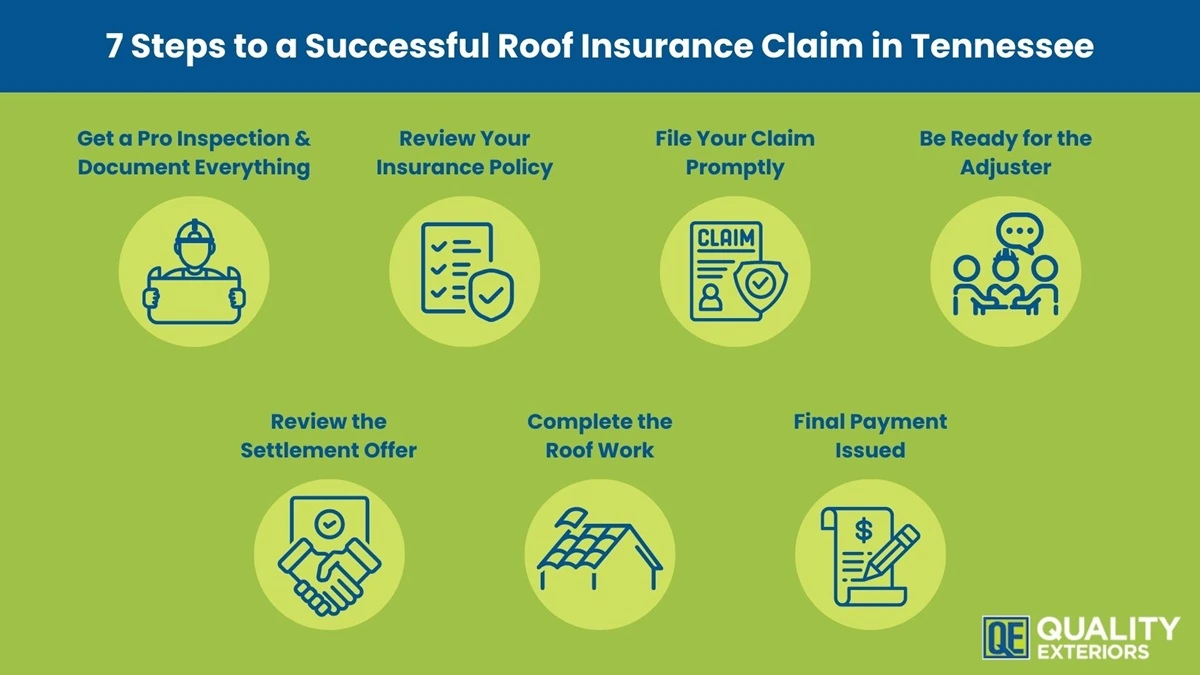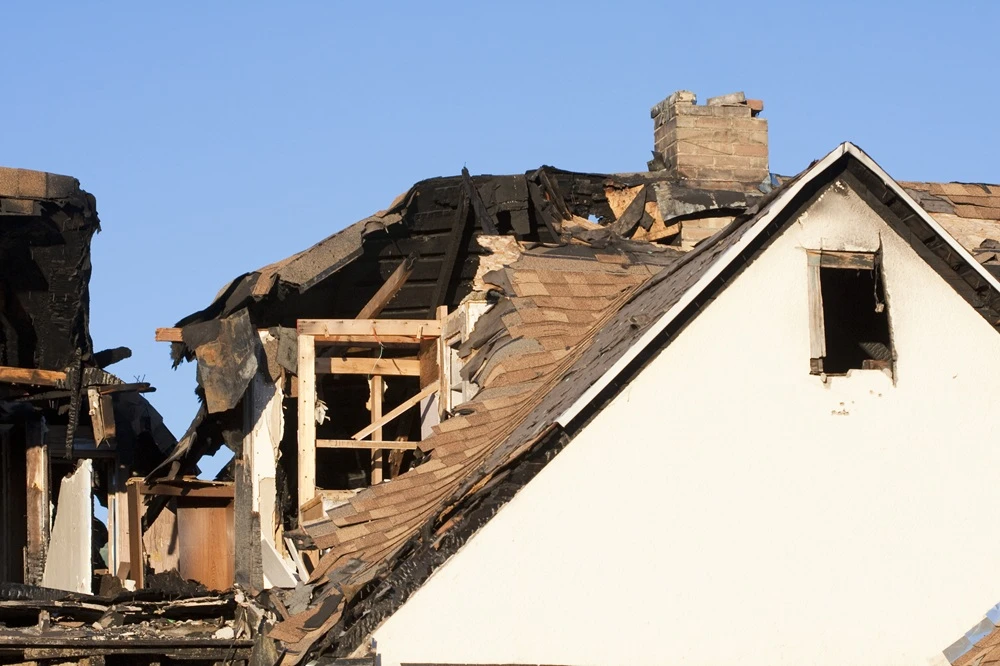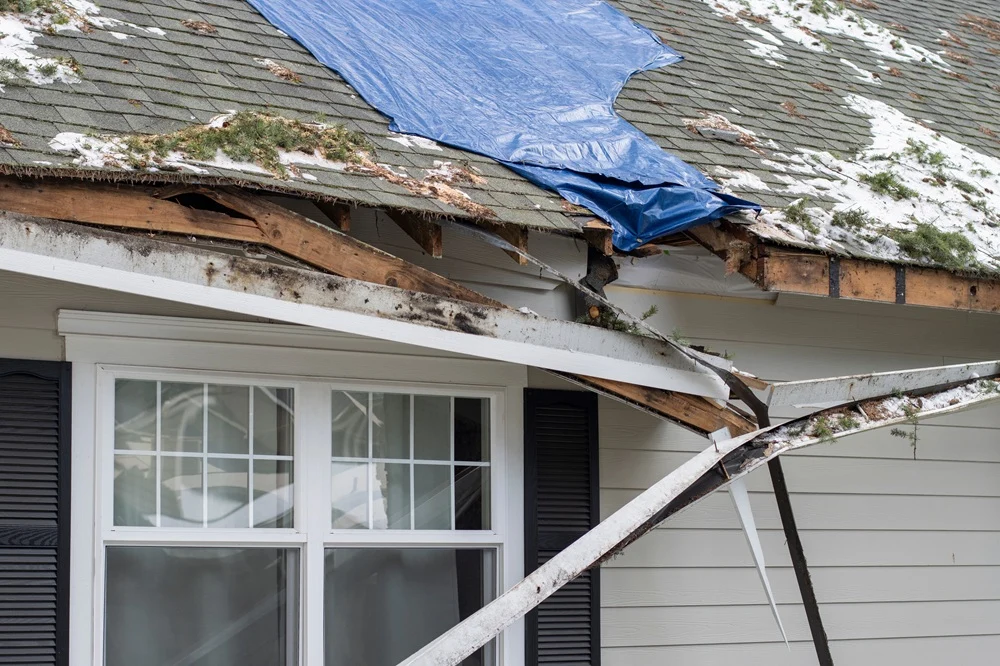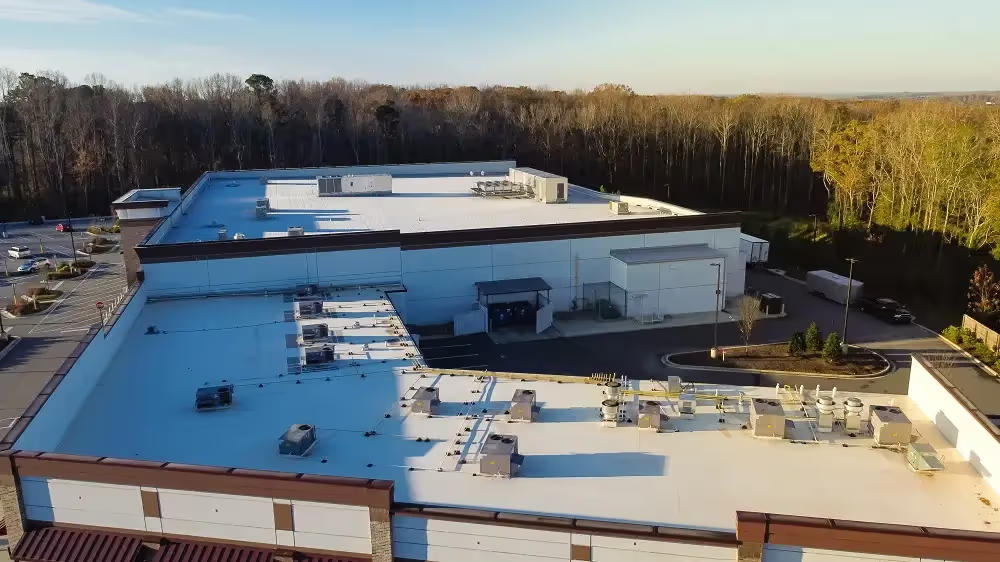When Does Homeowners' Insurance Cover Roof Replacement?
The starting point for any claim is knowing what your policy actually covers. Insurance is designed to step in when sudden damage occurs, not when a roof has been neglected or simply reached the end of its service life. That difference is what determines whether your claim moves forward or gets denied.
Here are the most common scenarios Tennessee homeowners face:
When your roof damage falls into the covered category, your insurer will usually approve full or partial roof replacement. The extent of coverage depends on your policy terms (RCV or ACV) and whether matching shingles are available under Tennessee's matching law.
Understanding Tennessee's Unique Matching Law
Tennessee homeowners have a significant advantage when it comes to roof insurance claims thanks to the state's matching law, which went into effect on October 9, 2017.
The specific regulation, Law 0780-01-05-.10(1)(b), states:
"When a loss requires replacement of items and the replaced items do not match in quality, color or size, the insurer shall replace items so as to conform to a reasonably uniform appearance according to the applicable policy provisions. This applies to interior and exterior losses. The insured shall not bear any cost over the applicable deductible, if any."
What this means for homeowners is simple: if your shingles cannot be matched, the insurance company must pay for a full replacement. This protection prevents you from being stuck with a patchwork roof and shields you from additional costs outside of your deductible.
The Roof Insurance Claim Process: Step by Step
Successfully navigating a roof insurance claim means knowing what happens at each stage and preparing ahead of time. Moving through the process in order helps your claim receive the attention it deserves from the insurance adjuster.

Step 1: Get a Professional Inspection and Document Everything
Here’s something many homeowners miss: Always call a trusted roofing contractor before your insurance company. A professional can assess storm damage, document it thoroughly, and let you know if filing a claim is worth it. This avoids unnecessary denials that could impact your insurance record — and helps you start the claim process with confidence.
While your contractor gathers their own detailed report, you should also take photos and videos of the damage from your perspective. Capture signs of trouble inside your home, such as leaks or water stains, along with exterior issues on the roof, gutters, and siding.
Step 2: Review the Details of Your Policy
Before you contact your insurer, take time to understand your policy. Coverage type directly affects how much money you will receive for repairs or replacement. Knowing these details in advance avoids surprises once the claim is processed.
You need to determine whether you have Replacement Cost Value (RCV) or Actual Cash Value (ACV) coverage:
- RCV Coverage: Pays for a complete roof replacement minus your applicable deductible.
- ACV Coverage: Pays for your roof's depreciated value, meaning you'll cover more costs out of pocket.
Learning the difference helps you plan for possible out-of-pocket costs and gives you a clearer idea of your settlement.
Step 3: File Your Claim Promptly
Once you’ve reviewed your policy and gathered documentation, contact your insurance company. Aim to file within 24 to 72 hours if possible. Reporting quickly shows that you have acted responsibly and have not allowed the problem to grow worse.
Be ready to provide the insurer with your photos, contractor’s findings, and a clear description of when and how the damage happened.
#cta_here
Step 4: Prepare for the Insurance Adjuster's Visit
Your insurance company will assign an adjuster to visit your property and verify the damage. This usually happens within a few days to a week of filing your claim.
Important: Have your roofing contractor present during this inspection. An experienced contractor can ensure the adjuster identifies all damage and provides an accurate assessment.
Step 5: Review and Accept Your Settlement
If the adjuster approves your claim, the insurance company will issue a settlement check. Homeowners often wonder, “What happens once I get the check?” With RCV policies, the first payment usually reflects the Actual Cash Value, and the final portion, called recoverable depreciation, is paid once the roof work is finished.
Step 6: Complete the Work
Choose a licensed, insured roofing contractor experienced with insurance claims to handle your roof replacement and roof repair cost negotiations. Look for contractors who understand Tennessee's building codes and have experience working directly with insurance companies to ensure your claim is handled properly.
Step 7: Finalize Payment and Close the Claim
When the roof work is complete, your contractor will submit proof of completion to the insurance company. This documentation allows the insurer to release any remaining funds, including recoverable depreciation for RCV policies.
At this point, the claim is closed, and your roof is fully restored.

What to Do if Insurance Denies Roof Claim?
A denied claim does not always mean the damage will go unpaid. Insurance companies sometimes turn down valid roof claims because the documentation was incomplete or the scope of damage was misunderstood.
Here’s a clear action plan if your claim is denied:
- Request a detailed explanation: Ask your insurance company to provide specific reasons for the denial in writing, including which policy provisions they're citing.
- Get a second professional opinion: Have another qualified roofing contractor inspect your roof to verify the damage and its cause.
- Gather additional evidence: Collect weather reports, photographs, and expert assessments that support your claim for storm damage.
- File a formal appeal: Submit an appeal in writing along with the new documentation to strengthen your case.
- Consider professional help: If the appeal is unsuccessful, consult a public adjuster or an attorney who works with insurance disputes.
Persistence often makes the difference. Many roof insurance claims in Tennessee are eventually approved when homeowners provide stronger documentation and follow the proper appeal process.
Timeline Expectations
Knowing how long each stage usually takes helps you stay realistic about the process:
- Initial response: Insurers typically respond within 24-48 hours.
- Adjuster visit: Usually scheduled within 3-7 days of filing.
- Claim decision: Most decisions are made within 14-30 days.
- Repair timeline: Work often takes 1-4 weeks, depending on damage and contractor availability.
- Final payment: Released once the contractor provides proof of completed work.
After severe storms, insurers and contractors may face large backlogs. Choosing a local contractor who knows Tennessee’s weather and insurance systems helps reduce unnecessary delays.

How to Avoid Common Pitfalls
Storms often attract contractors who are more interested in fast money than quality work. Staying alert protects both your roof and your insurance claim.
Red Flags to Avoid
Stay alert for these warning signs when choosing a contractor for your roof damage claim:
- Deductible waiving: Any contractor offering to “cover” your deductible is acting illegally and can put your claim at risk.
- Storm chasers: Door-to-door solicitors who appear immediately after storms often engage in roofing scams and pressure tactics.
- Upfront payment demands: Reliable contractors do not ask for full payment before work begins on insurance jobs.
- High-pressure sales: Avoid anyone urging you to sign a contract immediately without time to review it carefully.
Questions to Ask Potential Contractors
- Are you licensed and insured in Tennessee, and can you show proof?
- How many years of experience do you have with roof insurance claims?
- Can you share local references from recent insurance projects?
- Will you attend the adjuster’s inspection with me?
- How do you handle supplemental claims if more damage is discovered?

Working with Quality Exteriors
Since 2006, Quality Exteriors has helped homeowners across Middle Tennessee resolve roof insurance claims with confidence. As GAF Master Elite® and GAF President’s Club contractors, we combine advanced roofing expertise with a strong understanding of the claim process.
Our roof insurance claims process:
- Professional damage assessment: Free, comprehensive inspection documenting all damage with detailed cost estimates for repairs.
- Insurance claim filing: Complete claim preparation and filing assistance with dedicated Claims Specialist tracking.
- Adjuster coordination: Direct communication with your insurance adjuster to ensure all damage is properly recorded.
- Clear documentation: Thorough review of adjuster reports to verify estimates match your coverage requirements.
- Restoration: Full project management handling both initial and final insurance payments while delivering quality roof replacement or repairs.
We proudly serve Murfreesboro, Nashville, Franklin, and the surrounding communities. Our knowledge of Tennessee weather, building codes, and insurance requirements helps ensure every homeowner gets the support they need.








.avif)

